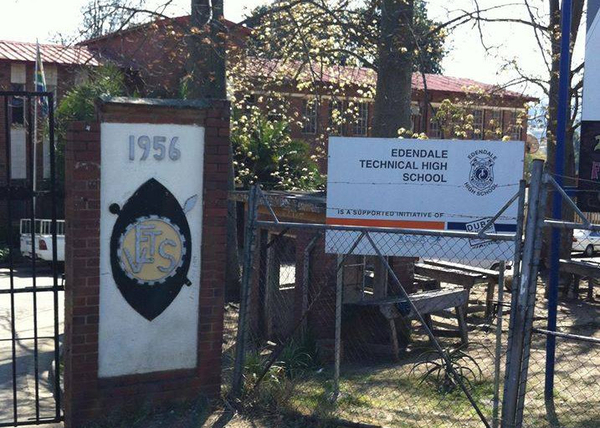Mother accuses principal of caning her son

Despite the South African Schools Act prohibiting the use of corporal punishment, caning continues in many schools. Now a Pietermaritzburg mother has had enough, and she’s laid a complaint with the police against her son’s school principal.
Nonhlanhla Khuzwayo is the mother of Mlondi (18), a grade 11 student at Edendale Technical High School in Pietermaritzburg. She has opened a case of common assault against the principal of the school for allegedly hitting her son using a cane.
The incident allegedly happened last week after Mlondi used a pepper spray in class.
Speaking to GroundUp about the incident, Khuzwayo said that Mlondi was caned by the principal, Mr Fano Ngubane, and two other teachers. “I take this as totally brutality on my son,” she said.
Mlondi carries the pepper spray for protection, apparently because of incidents of mugging that happen in the area after school. According to Mlondi he showed the pepper spray to his classmates who asked him to show it to them. “After that I accidentally sprayed it in class,” he said.
“The teacher asked me and other learners to leave the class. We did that and he called the principal and reported what happened. The principal asked for the pepper spray which I had thrown out of the window because I was scared. He called two other teachers and they started hitting me with a cane. It did not end there but they slapped me until I was helpless. I don’t know how many strokes I got on my bum. I reached a phase where I was numb and couldn’t do anything. After that he gave me R3.50 and told me to go and buy pain killers,” said Mlondi.
Although Mlondi’s mother acknowledged that he shouldn’t have used the pepper spray in class she says she does not support the “brutal attack by the principal and the teachers”. She said she went to the Department of Education offices to report the matter to the circuit manager but he was in a meeting. “It also took me some time to open the case because the police told me there might be a case opened against my son for carrying a pepper spray.”
“With all of that being said I concluded by opening a case against the principal. I’m not supporting my son’s behaviour but I’m against the beating. I totally disagree with the gang beating they did. He could have died from being beaten in such manner. I have nothing against the principal but his behaviour is totally unacceptable,” she said.
She added that although her son was recovering he was traumatised and scared.
Plessislaer police spokesperson Musa Ntombela said: “Police can confirm that a case of common assault has been opened. We are still investigating the matter.”
GroundUp has been trying to get hold of the principal since Wednesday last week. He has not answered his phone, despite our numerous calls and an sms. Nor has he been available at the school when we have called.
The Department of Education’s Sihle Mlotshwa said: “We are not aware of the incident but we will investigate the matter since it has been brought to our attention.”
Section 10 (1) of the South African Schools Act, (1996), states: ‘No person may administer corporal punishment at a school to a learner.’ It then says, “Any person who contravenes subsection (1) is guilty of an offence and liable on conviction to a sentence which could be imposed for assault’.
General Secretary of Equal Education, Tshepo Motsepe, said that from what people in his organisation had seen, corporal punishment continued to be a problem in rural areas as well as townships where district officials or parents have limited access to schools. “It is illegal and we hope the unions educate teachers about this. It’s an inhumane thing to do.”

This article is licensed under a Creative Commons Attribution-NoDerivatives 4.0 International License.


